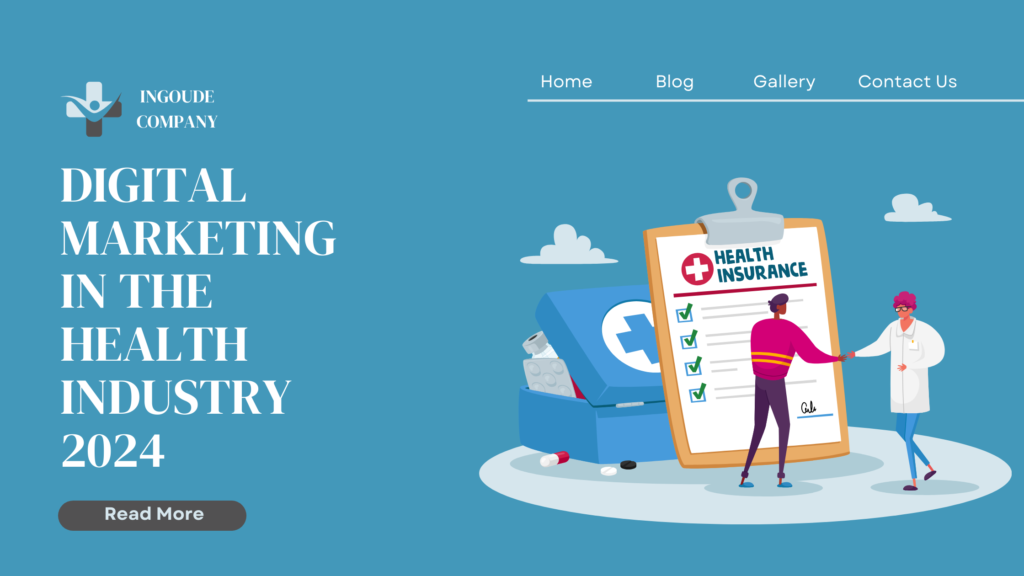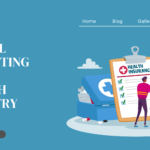
Digital Marketing in the Health Industry 2024
Digital marketing has revolutionized the way businesses engage with their audience, and the healthcare industry is no exception. In today’s digital age, healthcare providers and businesses must leverage online platforms and technologies to reach and connect with patients effectively.
The Importance of Digital Marketing for Healthcare Businesses
In the competitive landscape of the healthcare industry, digital marketing plays a crucial role in building brand awareness, attracting new patients, and retaining existing ones. Unlike traditional marketing methods, digital marketing offers a cost-effective way to target specific demographics and measure the success of marketing campaigns in real-time.
Understanding the Target Audience in Healthcare Digital Marketing
One of the fundamental principles of successful digital marketing is understanding the needs and preferences of the target audience. In the healthcare industry, this involves identifying the demographics, interests, and pain points of patients and tailoring marketing strategies accordingly.
Strategies for Effective Content Marketing in Healthcare
Content marketing is a cornerstone of digital marketing in the healthcare industry. By creating informative and engaging content, healthcare businesses can establish themselves as authoritative sources of information and build trust with patients.

Creating Engaging and Informative Blog Posts
Blogging allows healthcare providers to address common health concerns, share medical insights, and provide valuable tips for maintaining wellness. By regularly publishing high-quality blog posts, healthcare businesses can attract organic traffic to their websites and position themselves as thought leaders in their respective fields.
Read More : Performance Marketing: Driving Business Growth in the Digital Era
Utilizing Video Content for Patient Education
In addition to written content, video marketing has emerged as a powerful tool for patient education in the healthcare industry. Through informative videos, healthcare providers can explain complex medical concepts, demonstrate treatment procedures, and humanize their brand.
Leveraging Social Media Platforms
Social media platforms such as Facebook, Twitter, and Instagram offer healthcare businesses an opportunity to engage with patients on a more personal level. By sharing educational content, patient testimonials, and behind-the-scenes glimpses of their practice, healthcare providers can foster meaningful connections with their audience.
Search Engine Optimization (SEO) in Healthcare Digital Marketing
Search engine optimization (SEO) is essential for ensuring that healthcare websites rank high in search engine results pages (SERPs) and attract organic traffic. By optimizing website content, meta tags, and local listings, healthcare businesses can improve their online visibility and attract more patients.
Keywords and Their Role in Healthcare SEO
Keyword research is a critical component of healthcare SEO. By identifying relevant keywords and incorporating them strategically into website content, healthcare businesses can improve their chances of ranking for relevant search queries.
Optimizing Website Content and Meta Tags
Well-optimized website content and meta tags are essential for improving search engine rankings. Healthcare businesses should ensure that their website content is informative, easy to navigate, and optimized for relevant keywords.
Importance of Local SEO for Healthcare Practices
For healthcare practices that serve a specific geographic area, local SEO is particularly important. By optimizing local listings, such as Google My Business, and incorporating location-based keywords into website content, healthcare businesses can attract patients in their local area.
Email Marketing in the Health Industry
Email marketing remains one of the most effective ways for healthcare businesses to communicate with patients and nurture relationships over time.
Building an Email List
Building an email list allows healthcare businesses to stay in touch with patients and prospects and send them relevant content, promotions, and updates.
Personalized Email Campaigns for Patient Engagement
Personalized email campaigns can significantly increase patient engagement and conversion rates. By segmenting their email list based on demographics, interests, and past interactions, healthcare businesses can deliver targeted content that resonates with recipients.
Mobile Marketing Trends in Healthcare
With the widespread use of smartphones and mobile devices, healthcare businesses must optimize their digital marketing strategies for mobile users.
Importance of Mobile-Friendly Websites
Mobile-friendly websites are essential for providing a seamless user experience for patients browsing on smartphones and tablets. Healthcare businesses should ensure that their websites are optimized for mobile devices to avoid losing potential patients due to poor usability.
Mobile Apps for Patient Communication and Engagement
Mobile apps offer healthcare businesses a convenient way to communicate with patients, schedule appointments, and deliver personalized health-related content. By developing a mobile app, healthcare providers can enhance patient engagement and improve the overall patient experience.
Utilizing Data Analytics in Healthcare Digital Marketing
Data analytics plays a crucial role in optimizing digital marketing strategies and measuring their effectiveness.
Tracking Patient Engagement Metrics
By tracking metrics such as website traffic, email open rates, and social media engagement, healthcare businesses can gain insights into how patients interact with their online content and identify areas for improvement.
Analyzing Return on Investment (ROI) for Digital Marketing Campaigns
Analyzing the ROI of digital marketing campaigns allows healthcare businesses to assess the cost-effectiveness of their marketing efforts and allocate resources more efficiently. By tracking conversions, leads generated, and revenue generated from digital marketing activities, healthcare providers can determine which strategies are delivering the best results.
Regulatory Considerations in Healthcare Digital Marketing
Healthcare businesses must navigate various regulatory considerations when implementing digital marketing strategies to ensure compliance with industry standards and regulations.
HIPAA Compliance in Patient Communication
Healthcare providers must adhere to the Health Insurance Portability and Accountability Act (HIPAA) regulations when communicating with patients electronically. This includes ensuring the security and privacy of patient information and obtaining proper consent for electronic communication.
Adherence to FDA Guidelines for Pharmaceutical Marketing
Pharmaceutical companies must comply with the Food and Drug Administration (FDA) guidelines when marketing their products online. This includes providing accurate and balanced information about prescription drugs and avoiding misleading claims or off-label promotion.
Read More : How Digital Marketing is Useful in Industrial Companies
Case Studies: Successful Digital Marketing Campaigns in Healthcare
Examining real-world examples of successful digital marketing campaigns can provide valuable insights and inspiration for healthcare businesses looking to improve their online presence.
Challenges and Opportunities in Digital Marketing for Health Businesses
While digital marketing offers numerous benefits for healthcare businesses, it also presents unique challenges and opportunities that must be addressed.
Future Trends in Healthcare Digital Marketing
As technology continues to evolve, healthcare digital marketing will likely undergo significant changes in the future. Understanding emerging trends and technologies will be essential for healthcare businesses to stay ahead of the curve and maintain a competitive edge.
Conclusion
In conclusion, digital marketing has become indispensable for healthcare businesses looking to attract, engage, and retain patients in today’s digital age. By implementing effective digital marketing strategies, healthcare providers can increase their online visibility, build trust with patients, and ultimately drive business growth.
FAQs (Frequently Asked Questions)
- What are some common digital marketing strategies used in the healthcare industry?
- Answer: Common digital marketing strategies in the healthcare industry include content marketing, search engine optimization (SEO), email marketing, and social media marketing.
- How can healthcare businesses ensure compliance with regulatory requirements when implementing digital marketing strategies?
- Answer: Healthcare businesses can ensure compliance with regulatory requirements by familiarizing themselves with industry standards and regulations such as HIPAA and FDA guidelines and incorporating them into their digital marketing practices.
- What role does data analytics play in healthcare digital marketing?
- Answer: Data analytics allows healthcare businesses to measure the effectiveness of their digital marketing efforts, track patient engagement metrics, and analyze the return on investment (ROI) of marketing campaigns.
- What are some future trends in healthcare digital marketing?
- Answer: Some future trends in healthcare digital marketing include the increased use of artificial intelligence (AI) and machine learning, telemedicine, and virtual reality (VR) technologies to deliver personalized and immersive patient experiences.
- How can healthcare businesses stay ahead of the curve in digital marketing?
- Answer: Healthcare businesses can stay ahead of the curve in digital marketing by staying informed about emerging trends and technologies, investing in ongoing education and training for their marketing teams, and regularly evaluating and optimizing their digital marketing strategies.



